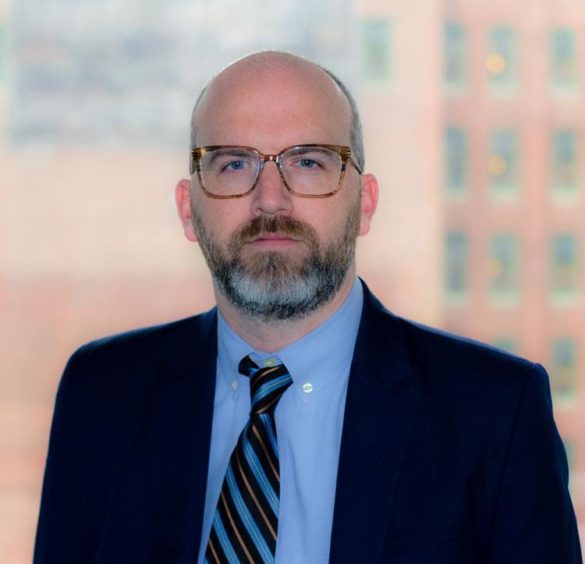New York City leaders have found a way to work around federal laws to authorise the first “publicly recognised” drug taking rooms in the US – but could Scottish politicians learn from their counterparts in the Big Apple?
Nicola Sturgeon’s SNP Government wants to set up similar supervised centres where trained staff provide clean needles, offer access to treatment services and stand by with life-saving anti-overdose drugs.
However, the UK Government is responsible for drug laws and has long been opposed to any change in legislation that would allow that to happen.
In New York, mayor Bill de Blasio says he has found a way around a similar problem with federal rules to tackle a drug deaths crisis that mirrors our own.
With more people dying every year, and the cost to society and the health service growing, could Scotland find answers in the city that never sleeps?
How New York is tackling drug deaths
Health officials and communities in the US have been locked in the same debate being played out in Scotland over whether to move away from a judicial method of dealing with problematic drug use and instead embrace supervised injection sites.
Some facilities were already operating under the radar but now two sites – in the neighbourhoods of East Harlem and Washington Heights – have become the first officially recognised “overdose prevention centres” in the US.
It is a bold step that has been years in the making and city mayor Bill de Blasio says it comes at a “crucial” time.
More than 2,000 people died of a drug overdose in New York last year – the highest number since reporting began in 2000 – and across the US, a record 90,000 individuals died of the same cause in 2020.
It is a crisis familiar to Scotland, where a total of 1,339 deaths attributed to drugs were recorded last year, up from 1,264.
Dundee has been particularly badly hit and has even been suggested as a possible pilot site for any trial of safe consumption rooms.
However, as in Scotland, the push to provide supervised spaces for drug users in the US has faced fierce criticism and legal wrangles.
What is the law and can it broken?
Possession, use, or distribution of illicit drugs is prohibited by federal law.
Even though states have their own laws on drugs, federal laws supersede state laws and this allow officials to enforce federal rules in any jurisdiction.
In most cases, these powers are used to tackle major crimes, such as drug trafficking.
Speaking at a press briefing attended by us this week, New York mayor Bill de Blasio explained how local supervised injection sites are able to operate in what critics say may be a violation of federal law.
Thank you @Surgeon_General Murthy!
Our Overdose Prevention Centers are about confronting a public health crisis that was with us long before #COVID.
The opioid crisis didn’t pause during the pandemic and cities must lead the way to end this crisis for good. pic.twitter.com/vH6P9maZIA
— Mayor Bill de Blasio (@NYCMayor) December 1, 2021
He said: “Our law department, their analysis is that the federal law is aimed at drug trafficking not at medical facilities. These are medical facilities.
“These are facilities specifically created to save lives. They’re overdose prevention centres. They are exactly what we say they are and we believe that actually is allowable.”
The mayor also sent a letter to the those providing the services promising “not to take enforcement action” against their operations.
Thank you @galeabrewer for stopping by to tour our #EastHarlem office and to learn more about our critical, life saving, and #overdoseprevention services. We look forward to working more closely with you in the future. #NYC #harmreduction #harmreductionsaveslives pic.twitter.com/C8ULqDPYmF
— NYHRE (@NYHarmReduction) December 3, 2021
President Joe Biden and his administration have embraced harm reduction methods but have not explicitly endorsed supervised injection sites.
Other cities including Philadelphia, San Francisco, Boston and Seattle have taken steps toward supervised injection but have yet to open any centres amid debate over the legal and moral implications of facilitating illegal drug use.
Critics argue they could normalise drugs or attract users and dealers to the neighbourhoods they open in.
The US Justice Department has not yet set out how it intends to respond but the NYPD says it has “no plans” to target people connected to the sites.
Why leaders believe it is time for change
Activists in the US have been pushing for change for years and in some ways policymakers have had their hand forced by the harrowing number of drug deaths.
A US Health Department feasibility study into supervised injection sites in New York found they could save up to 130 lives a year.
The mayor’s office also points to work by the European Monitoring Centre for Drugs and Drugs Addiction showing the facilities are “proven to prevent overdose deaths” and that there has never been a fatal overdose inside one.
Mr de Blasio said: “After exhaustive study, we know the right path forward to protect the most vulnerable people in our city. And we will not hesitate to take it.
“Overdose prevention centres are a safe and effective way to address the opioid crisis. I’m proud to show cities in this country that after decades of failure, a smarter approach is possible.”
That so-called smarter approach has already seen lives saved.
There were five overdoses at the centre in East Harlem on its first day under the new scheme but not a single one was fatal.
What is the Scottish Government doing?
Scotland looks set to launch its own trial of drug consumption rooms after Scottish Conservative leader Douglas Ross dropped his outright opposition to the idea and said he would raise the proposal with party colleagues at Westminster.
Mr Ross was moved by charity leaders to reconsider his position and said he would not stand in the way of the Scottish Government launching a pilot scheme.
The Scottish Tory leader could provide an essential bridge between Scotland’s two Parliaments but has said he would like to see any trial packaged with the legal right to drug recovery Bill his party is seeking to introduce at Holyrood.
The Scottish Government says it is “actively exploring” how to overcome legal barriers.
Meanwhile, Scotland’s most senior law officer, Lord Advocate Dorothy Bain, announced in September a radical shake-up of the justice system that some have branded “de facto decriminalisation”.
People caught with class A drugs such as heroin will now be offered a police warning instead of being referred to prosecutors, similar to the previous set up for Class B and C.
The move will not apply to drug supply offences and Ms Bain stressed it does not amount to formal decriminalisation.
Early evidence of success
It is another bold early step towards tackling the scourge of drug deaths and follows the lead of cities like Baltimore, which is already seeing early signs of success.
A report from researchers at Johns Hopkins University found Baltimore’s no-prosecution policy for minor drug possession and prostitution led to fewer new low-level arrests, fewer 911 calls and almost no rearrests for serious crime.
The findings suggest the new policies did not result in increased public complaints about drug use or sex work, and that those who had charges dropped did not go on to commit serious crimes.
Michael Collins is a Scottish drug policy expert who has helped push decriminalisation in the US and is a former director at the Drug Policy Alliance’s Office of National Affairs.
He is now working as strategic policy director for Marilyn Mosby, the State’s Attorney for Baltimore, and held talks with Scottish Government officials about using the role of the lord advocate to move away from prosecuting drug users.
Mr Collins – who previously called for Scottish ministers to push on with decriminalisation and dare Westminster to block it – has warned introducing supervised drug consumption rooms could be tricky under the current devolution settlement.
But he insisted Scotland can make a start now on tackling drug deaths by following Baltimore’s lead in redirecting cash previously used to arrest and process low-level drug users to beef up treatment services and target criminal gangs.
“You’re talking about a shift of resources,” Mr Collins said.
“Logically, if police are spending less time and energy, along with prosecutors, the courts and the judicial system generally, on drug arrests, there should be funding redirected to those treatment services.”


